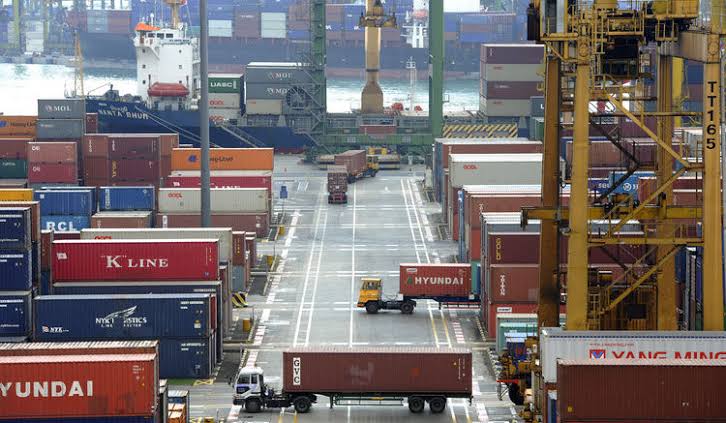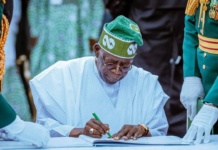By Olakunle Agboola – In recent years, the Chinese have become the most important economic partners of Africa and their footprints are growing rapidly. Thereby, transforming Africa’s International relations in a dramatic way.

The bilateral relations between the Federal Republic of Nigeria and the People’s Republic of China have expanded on growing bilateral trade and strategic cooperation. China is considered one of Nigeria’s closest ally and partner. They are also one of Nigeria’s important trading and export partners. According to a 2014 BBC World Service Poll, 80% of Nigerians view China’s influence positively, with only 10% expressing a negative view.
The formal the Charge d’Affairs of Chinese Embassy in Nigeria, Qin Jian revealed that, the bilateral trade volume between China and Nigeria from January to July 2016, stood at $6.46 billion. This represented 7.6 percent of the total trade volume between China and Africa, 36.4 percent of total trade volume between China and ECOWAS.

It is unfortunate that the full details of this analysis in the ratio of imports to exports were not stated. However, it was revealed that in 2016, Nigeria spent about N1.57 trillion to import goods from China as compared to a measly N157.5 billion obtained from export to China, showing that Nigeria imported ten times more than their exports to China. It was also estimated that in 2016, Nigeria spent about N839 billion on imports from China and earned just N82.3 billion from exports.
China has adequately benefited from the balance of trade between both countries, where import from China between 2013 and 2016 was 7.8 times more than Nigeria’s export. China is one of the few trading partners that Nigeria still operates a trade deficit with, as 22 percent of Nigeria’s imports between 2012 and 2016 were from China, while only 1.5 percent of exports went to China. The Chinese Embassy who have immensely benefited from imports brought into Nigeria, however, never mentions this imbalance.
1n 2015, the Industrial and Commercial Bank of China Ltd (ICBC) and Nigeria’s Central Bank allegedly agreed on a currency swap deal. The purpose of the deal was to address short-term foreign currency liquidity challenges and ease the pressure on the dollar as China’s trade relations with Nigeria was on the rise. The currency swap deal has its downsides because it has the potential to weaken Nigeria’s domestic production, as the country would then rely on China’s imports since importers would have easy access to the Chinese Yuan to bring in cheap goods rather than produce within the country. The government has however denied the swap deal.
Nigeria needs to improve its domestic trade capacity to possess a favourable trade position with China. Creating partnerships with the Chinese should be to increase manufacturing capacity of goods. Nigeria has the capacity to produce for itself rather than depending on import from China. A conscious deficit gap closing should be seen if Nigeria continues to progress in its industrialisation agenda. Nigeria’s sole focus should be on creating a sustainable model to ensure local economic development and growth.
Nigeria’s unfavourable trade with China has led to the collapse of industries like the textile industry. China has been associated with the importation of several substandard items into Nigeria with the Federal Government doing little or nothing to stop this. In 2015, the National Agency for Food and Drug Administration and Control (NAFDAC) reported that 91 percent of tomato pastes imported into Nigeria were substandard with most of these imports arising from China and India. China has been a major beneficiary of the slump in the oil prices with Nigeria being an exporter of crude oil to China.
Staff relations remains an area that the Nigerian government has failed to handle properly. Scores of Nigerian workers have accused Chinese employers of maltreating their staff and poorly compensating them. It is also rare to see Nigerians within the leadership structure of Chinese companies based in Nigeria. “What is the economic sense if the deal allows Chinese to take 100 jobs out of 110 jobs, leaving only 10 for Nigerians?” said Nigerian Industrialist, Mazi Sam Ohuabunwa.
Most Chinese companies rather bring their citizens into Nigeria without transferring any major technical skills to Nigerians. This is as a result of lack of law creation and enforcement regulating labour relations within the country.
The mentality that China’s current relation with Nigeria is a favourable one needs to be changed. Rather, Nigeria must seek to accept only partnerships that would benefit the country rather than hurt us. “A review of the exploitative elements in this marital contract is long overdue. Every romance begins with partners blind to each other’s flaws before the scales fall away and we see the partner, warts and all. We may remain together – but at least there are no illusions”, said Sanusi Lamido’s Sanusi, former Governor, Central Bank of Nigeria and Emir of Kano.
Several analysts and commentators like Emir of Kano hold diametrically opposite views on the implications of the emergence of China on the world stage for African development prospect. However, I find the position of His Excellency, Jakaya M. Kikwete, Former President of the Republic of Tanzania quite inspiring as he rightly stated that China and India will not transform Africa; Africans will transform Africa (World Economic Forum on Africa, 2006).
In view of this, I implore all African leaders to wake up to build a large room of development rather than trapping themselves in a small room of thinking. Nigeria, most especially must change her paradigm from being a consuming nation to a producing nation. She must be industrialised while the populace should be encouraged to patronize, ‘made in Nigeria goods.’ In addition, for ‘made in Nigeria goods’ to be competitive, the nation needs uninterrupted power supply coupled with focusing on standard regulatory control of products that is not blurred by corruption. This will help put Nigeria in her rightful place within the community of nations.
Kindly follow us on twitter:@AfricanVoice2








